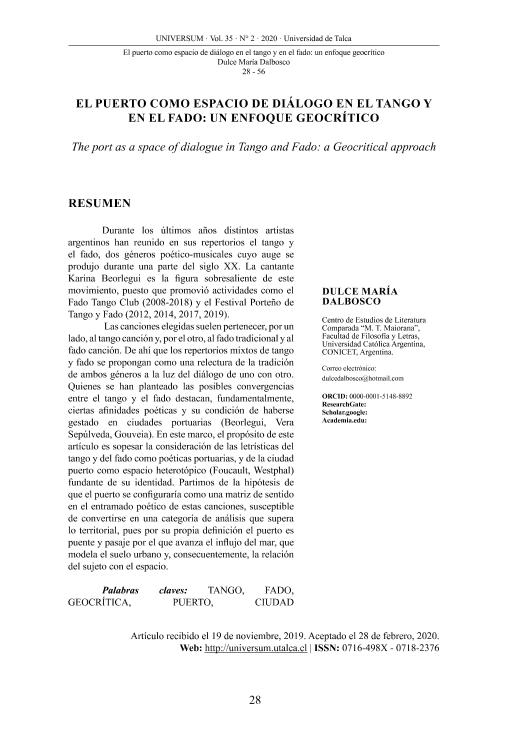Mostrar el registro sencillo del ítem
dc.contributor.author
Dalbosco, Dulce María

dc.date.available
2022-10-12T12:52:50Z
dc.date.issued
2020-12
dc.identifier.citation
Dalbosco, Dulce María; El puerto como espacio de diálogo en el tango y en el fado: un enfoque geocrítico; Universidad de Talca; Universum; 35; 2; 12-2020; 28-56
dc.identifier.issn
0716-498X
dc.identifier.uri
http://hdl.handle.net/11336/172626
dc.description.abstract
Durante los últimos años distintos artistas argentinos han reunido en sus repertorios el tango y el fado, dos géneros poético-musicales cuyo auge se produjo durante una parte del siglo XX. La cantante Karina Beorlegui es la figura sobresaliente de este movimiento, puesto que promovió actividades como el Fado Tango Club (2008-2018) y el Festival Porteño de Tango y Fado (2012, 2014, 2017, 2019). Las canciones elegidas suelen pertenecer, por un lado, al tango canción y, por el otro, al fado tradicional y al fado canción. De ahí que los repertorios mixtos de tango y fado se propongan como una relectura de la tradición de ambos géneros a la luz del diálogo de uno con otro. Quienes se han planteado las posibles convergencias entre el tango y el fado destacan, fundamentalmente, ciertas afinidades poéticas y su condición de haberse gestado en ciudades portuarias (Beorlegui, Vera Sepúlveda, Gouveia). En este marco, el propósito de este artículo es sopesar la consideración de las letrísticas del tango y del fado como poéticas portuarias, y de la ciudad puerto como espacio heterotópico (Foucault, Westphal) fundante de su identidad. Partimos de la hipótesis de que el puerto se configuraría como una matriz de sentido en el entramado poético de estas canciones, susceptible de convertirse en una categoría de análisis que supera lo territorial, pues por su propia definición el puerto es puente y pasaje por el que avanza el influjo del mar, que modela el suelo urbano y, consecuentemente, la relación del sujeto con el espacio.
dc.description.abstract
In recent years, different Argentinian artists have gathered Tango and Fado in their repertoires, two musical and poetical genres which boom took place during some part of the Twentieth Century. Singer Karina Beorlegui is the outstanding figure of this movement, since she has promoted activities such as the Fado Tango Club (2008-2018) and the Festival Porteño of Tango and Fado (2012, 2014, 2017, 2019). The chosen songs usually belong, on one hand, to the Tango-song period, and, on the other, to the Fados known as traditional Fado and Fado-song. Consequently, the mixed repertoires of Tango and Fado propose a rereading of the tradition of both genres and promote the dialogue between them. Those who have thought about the possible convergences between Tango and Fado have highlighted, fundamentally, certain poetic affinities and their condition of having been developed in port cities (Beorlegui, Vera Sepúlveda, Gouveia). In this context, the purpose of this article is to consider the lyrics of Tango and Fado as Port Poetics, and the port city as a heterotopia (Foucault, Westphal) in which its identity is based. Our starting point is the hypothesis that the port could be conceived as a matrix of meaning in the poetic structure of these songs. In fact, the port city could become a category of analysis that exceeds its territorial aspect, because by definition the port is a bridge and a passage through which the influence of the sea advances, models the urban land and, consequently, the relationship of the individual with space.
dc.format
application/pdf
dc.language.iso
spa
dc.publisher
Universidad de Talca
dc.rights
info:eu-repo/semantics/openAccess
dc.rights.uri
https://creativecommons.org/licenses/by-nc/2.5/ar/
dc.subject
TANGO
dc.subject
FADO
dc.subject
GEOCRÍTICA
dc.subject
PUERTO
dc.subject
CIUDAD
dc.subject.classification
Literaturas Específicas

dc.subject.classification
Lengua y Literatura

dc.subject.classification
HUMANIDADES

dc.title
El puerto como espacio de diálogo en el tango y en el fado: un enfoque geocrítico
dc.title
The port as a space of dialogue in Tango and Fado: a geocritical approach
dc.type
info:eu-repo/semantics/article
dc.type
info:ar-repo/semantics/artículo
dc.type
info:eu-repo/semantics/publishedVersion
dc.date.updated
2022-10-11T19:37:14Z
dc.identifier.eissn
0718-2376
dc.journal.volume
35
dc.journal.number
2
dc.journal.pagination
28-56
dc.journal.pais
Chile

dc.journal.ciudad
Talca
dc.description.fil
Fil: Dalbosco, Dulce María. Consejo Nacional de Investigaciones Científicas y Técnicas; Argentina. Pontificia Universidad Católica Argentina "Santa María de los Buenos Aires". Facultad de Filosofía y Letras. Departamento de Letras. Centro de Estudios de Literatura Comparada "María T. Maiorana"; Argentina
dc.journal.title
Universum

dc.relation.alternativeid
info:eu-repo/semantics/altIdentifier/url/https://www.scielo.cl/scielo.php?pid=S0718-23762020000200028&script=sci_arttext
dc.relation.alternativeid
info:eu-repo/semantics/altIdentifier/doi/http://dx.doi.org/10.4067/S0718-23762020000200028
Archivos asociados
